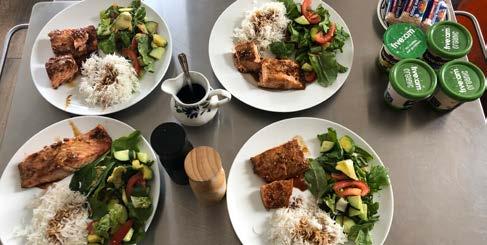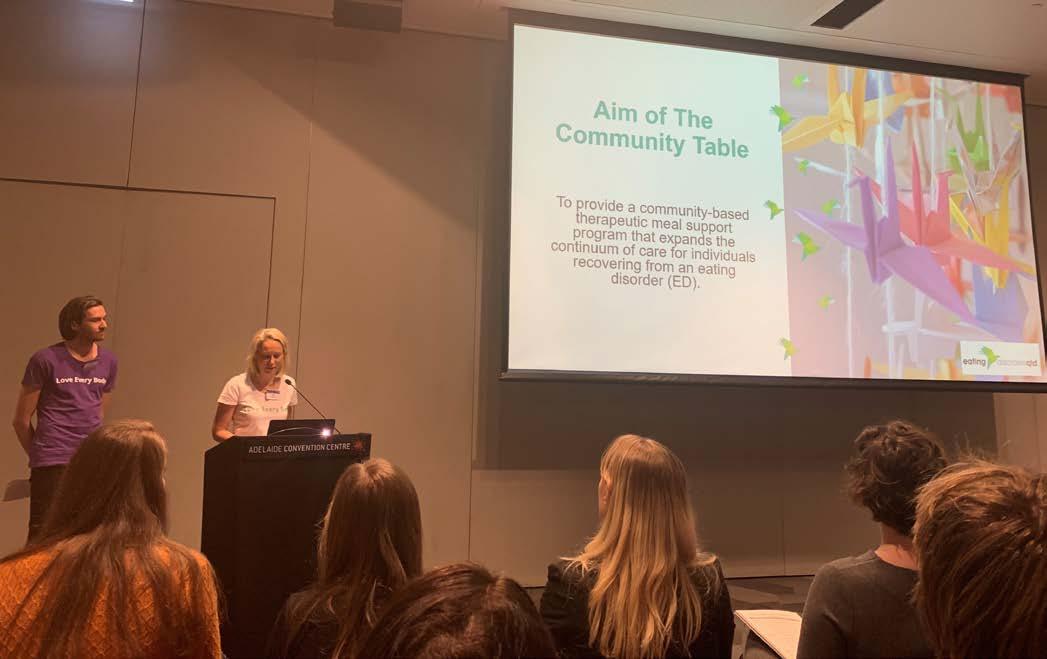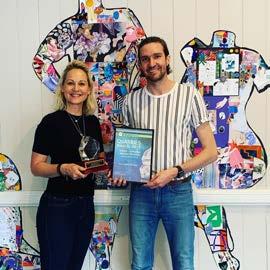
5 minute read
Community Table
Recovery Through Connected Eating
The Community Table is a group-based meal support program that aims to provide a
Advertisement
toward nutrition related goals (i.e. adequate eating, variety, and social eating). The program also aims to provide a supportive environment for individuals to manage meal related anxiety and distress in the moment and practice skills and activities that may be helpful in managing meal related anxiety and distress. The Community Table included a range of craft, gardening, sensory and mindfulness-based activities. After the initial success in the development and delivery of The Community Table in the previous
supportive environment for individuals working
financial year, EDQ facilitated four rounds of the program between July 2019 and February 2020.

For the second year in a row, EDQ partnered with the Queensland Eating Disorder Service Day Program who provided a co-facilitator for each round. Eating Issues Practitioner David co-facilitated the first, third and fourth rounds and Senior Eating Issues Practitioner Emma co-facilitated the second round. Eating Issues Practitioner Lisa also co-facilitated the fourth round of the program.

Statistical analysis of quantitative data was completed by Dr Yvette Miller at the School of
Public Health and Social at the Queensland University of Technology. This evaluation examined the outcomes off all nine programs completed in the 2018/19 and 2019/20 financial years. As with the evaluation of the pilot program, the results were promising and included a statistically significant reduction in eating disorder symptomology across the Restraint and Shape concerns subscales of the Eating Disorder Examination Questionnaire (EDE Q). The evaluation also identified a very confident reduction in the global EDE Q score.

Participants reported that they found the structure and activities of the program helpful in managing meal related anxiety and distress. Participants also reported that they found the group environment supportive when working toward nutritional goals.
Participant Quotes:
“I found it helpful that it didn’t focus solely on the meal but more on the time before and afterwards. I found the activities to be very calming. I enjoyed making the eye masks which I have used to relax when anxious.
Due to COVID-19, EDQ made the difficult decision to not deliver the program via a telehealth platform as there were concerns that there would be unique difficulties in providing a safe and supportive environment for a group-based meal support program. Instead, EDQ shifted to telehealth based individual meal support as this was it provided a greater level of safety and support for the client.
EDQ will recommence the delivery of The Community Table when it is safe to facilitate group-based programs in person.
Practitioner David and General Manager Belinda presenting the findings from the Community Table program at the 2019 ANZAED Conference in Adelaide


Our fantastic ‘Community Table’ meal support program was nominated for, and won, a QUARRIES Award in the Category of Fostering Innovation Project – Mental Health Services. Practitioner David is pictured here with General Manager Belinda after receiving the award.
EDQ offered a peer support worker role which sought to complement other therapies and offer a safe, compassionate space to connect with a peer who understands the struggle involved with overcoming an eating disorder.
Peer Worker Lisa undertook training in Intentional Peer Support, a methodology that prioritises a reciprocal learning relationship, with the goal of building community-oriented help. This helped to inform the peer worker role as a role where “recovery” becomes a mutual, dynamic relational process and outcome. Lisa provided nonjudgemental, compassionate support through one-on-one intentional peer support sessions, connecting, and relating to the lived experience of recovery through art activities and meal support. The peer support worker role values all individuals as experts of their own experience and seeks to reduce the experience of isolation that can be a key issue in the eating issues community.
Following Lisa’s promotion to EDQ Practitioner, EDQ then engaged a support worker role from
Medicare Services
EDQ’s Medicare counselling team consistent of Jane Bowman (Mental Health Social Worker) and Rosie Quinlan (Clinical Psychologist). Carolyn Uhlmann (Psychologist) provided Medicare services throughout 2019. Megan Bray (Dietitian) provides Medicare-subsidised dietetic sessions and this has continued to remain successful with Megan increasing her hours throughout 2019/2020. February ’20 to June ’20. This role was directly informed by Lisa’s training and experience in Peer Work. Support work provides a practical adjunct to client’s current therapy, giving clients the opportunity to practice the skills learnt in therapy in a safe and supportive space. The session entailed of a strengths focused approach, where both client and worker worked together to manage meal-time distress. Amber and her clients created Distress Tolerance Toolboxes, engaged in Supportive Meal therapy and pre and post meal activities to manage discomfort.
This service continued via ZOOM as we transitioned to working from home in March ’20. Online, one-on-one Meal Support was helpful in bringing support to our clients in their homes. Amber provided this service to 12 clients who on average received 10 sessions before transitioning to another group or service within EDQ. Amber then transitioned to the COVID Rapid Response Team. The Support Worker role became an important informant to the creation of the Peer
EDQ has continued to successfully run a Medicare counselling stream through 2019 and 2020. Clients with a mental health care plan, Eating Disorder Care Plan (introduced November 2019) and Enhanced Primary Care Plan can access Medicare-subsidised individual counselling or dietetic sessions.
Worker Role in the COVID Rapid Response Team.
Rosie Megan Jane
In November 2019, new Medicare item number were introduced by the Federal Government. The Eating Disorder Care Plan (Medicare benefits scheme item numbers) can deliver up to 40 psychotherapeutic sessions and 20 dietetic sessions across a range of eating disorders and requires a GP assessment.
This has increased access and affordability to evidence-based treatment for our clients and continues to grow.
The Medicare team have adapted to the ongoing changes during the COVID-19 pandemic. The introduction of new Medicare telehealth items has allowed clients to continue to access their practitioner via telehealth. As restrictions eased, clients have decided with their practitioner if they will continue with telehealth sessions or re-commence face-to-face. EDQ stayed up to date with announcements and ongoing recommendations during the pandemic.
The growing demand for counselling and dietetic sessions under the Medicare stream has led EDQ to bringing on another contractor to provide services and increase accessibility to support.










